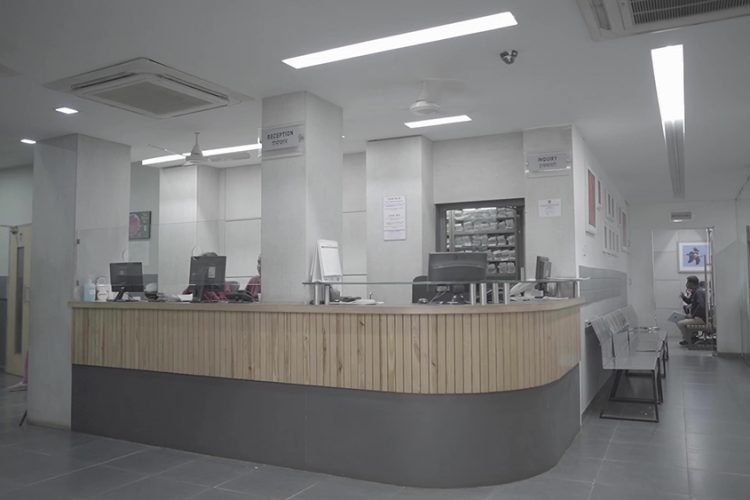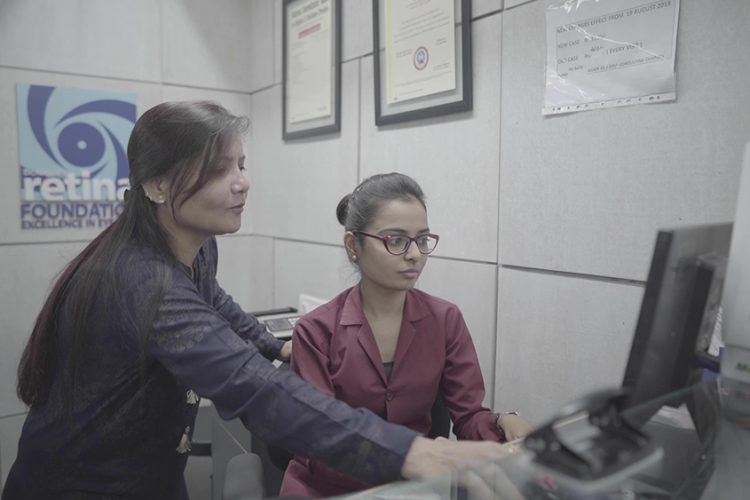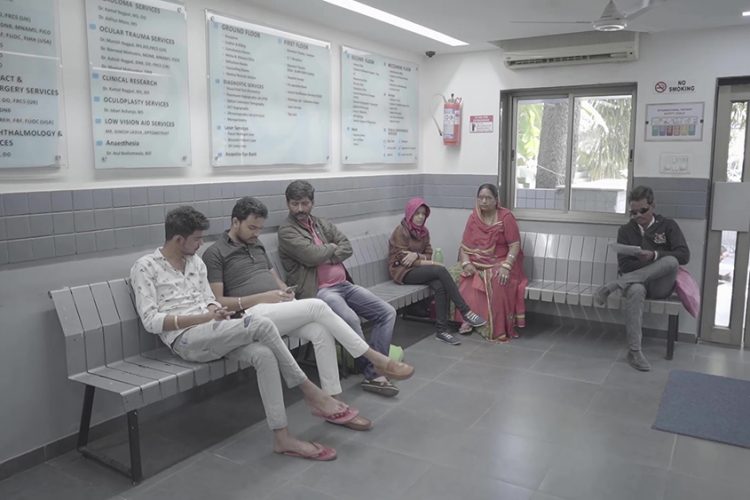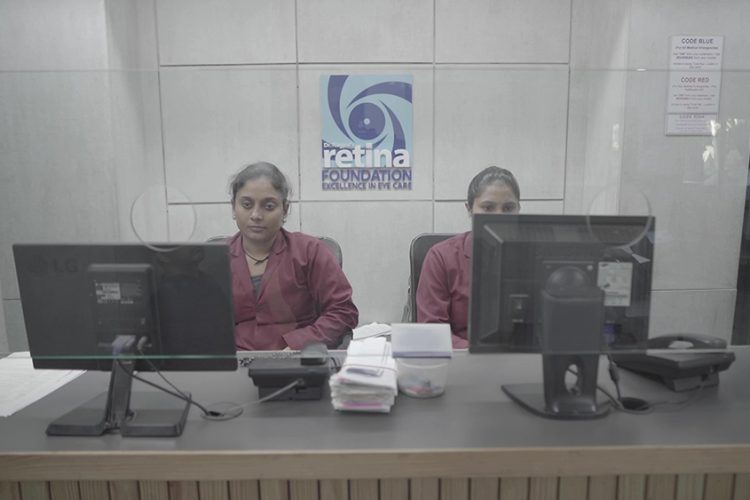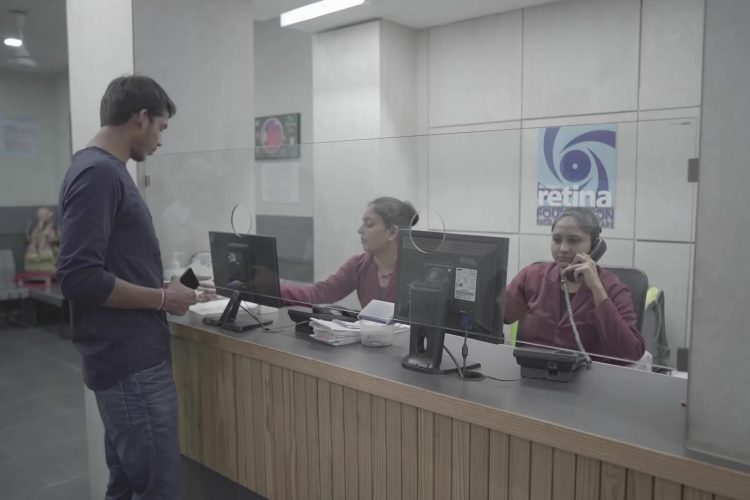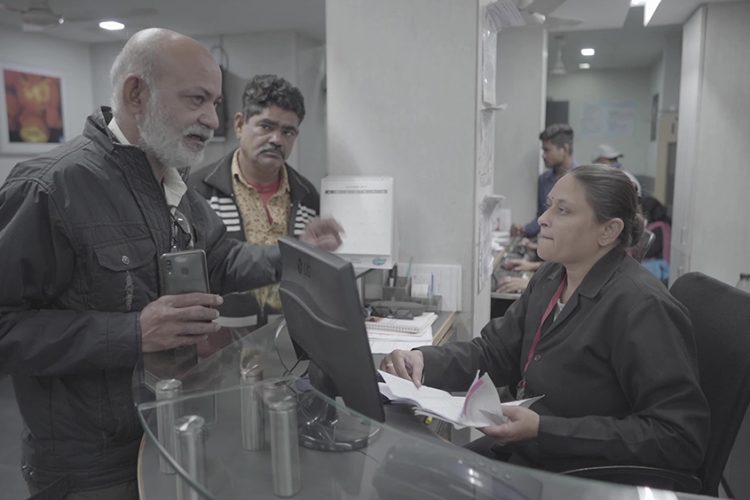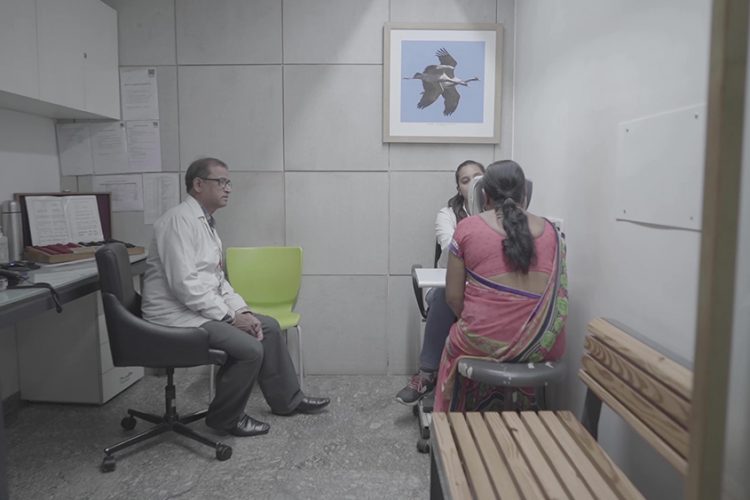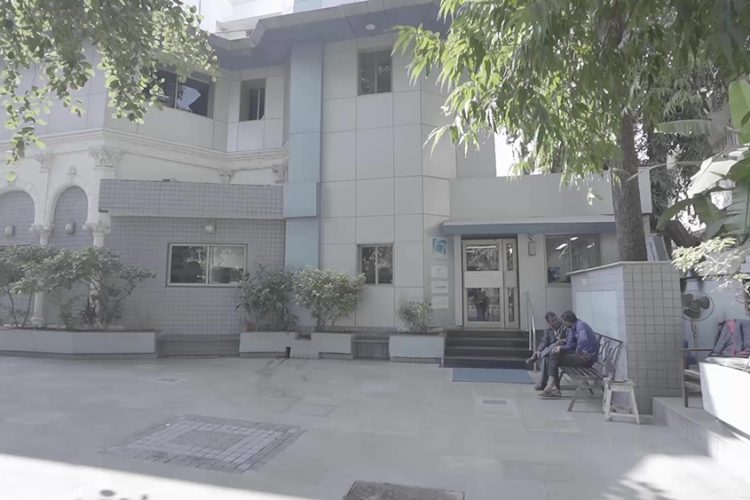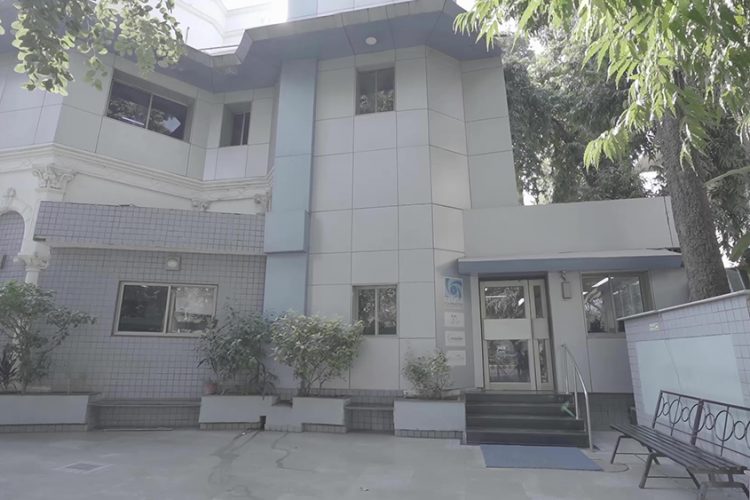Nagpal Eye Hospital Shahibaug – Reliable Eye Care at Retina Foundation
For trustworthy eye care in Gujarat, visit Nagpal Eye Hospital in Shahibaug, managed by Retina Foundation and Eye Research Center. Our expert team at the Retina Research Center ensures top-notch treatment for all your vision health needs.
This particular page is specially for YOU to get an overview about your eye and the links on the left provide information for YOU about common eye problems and surgery at our hospital and centre.
We thank you for placing your trust in us and sincerely hope that you shall be satisfied with our team of competent doctors and staff.
Since the last 44 years it has been a constant endeavor to provide you with world class, comprehensive and compassionate eye care.
Unlike a brief glasses check at your local optical shop , a COMPLETE EYE CHECK UP requires special tests and investigations, which shall be carried out by eye doctors and other ophthalmic health care providers using latest, state of the art equipment
As you might be aware, a COMPLETE EYE CHECK UP requires special tests and investigations, which shall be carried out by eye doctors and other ophthalmic health care providers using latest, state of the art equipment.
Step 1 - Registration
Pre Registration:
At the reception counter ,one of the front office executives will request you to write your name, complete address, telephone numbers and other details which help us in communicating better with you.
Registration/ Billing:
Subsequently, you will be registered and allotted a registration number. Your information will become a part of our computerized data base, for all future reference, every time you visit or call our centre.
Step 2- Initial Pressure Check and Dilatation
Intra-Ocular Pressure(IOP):
Now the Intra-Ocular Pressure (IOP) i.e. pressure of your eye will be checked with a automated instrument specifically designed for this purpose. Any abnormality in the eye pressure could mean serious eye disease.
Waiting Lounge:
You now need to sit in the waiting area and depending on the information given and your IOP (Intraocular Pressure) you will be advised for your eye/s (Pupil/s) to be dilated for detailed examination of the retina.
In the main hall our Patient Care Attendants will put the dilating eye drops (Tropicacyl and Phenylepherine drops) in your eyes as often as necessary. Some patients may need more drops and time than others. You are requested to sit with your eyes closed for better effect of the drops.
At this point you may feel that waiting is long, but let us assure you that it will be worth the wait. As every eye is unique, so is yours. Hence some people need more time in the doctor’s room and some individuals eyes (pupils) do not get dilated as easily.
Step 3- Ophthalmic History and Examination
Initial Detailed Eye Check up:
Later when your turn comes you will be asked to go to Doctor’s room. Here a detailed inquiry about your eye condition, its previous treatments or surgery and your past and family history will be documented.
PLEASE DO TELL THE DOCTOR IF YOU HAVE ANY DRUG ALLERGIES.
A detailed examination of your eye will be done with special slit microscopes, indirect ophthalmoscopes and other instruments by the doctor.
Step 4 - Refraction/ Glass check up
Refraction ( Glasses)
If deemed necessary by the doctor, you will be asked to wait to be seen by our Optometrists/Refractionists, who will check your vision and do special tests to finalize the proper prescription of your glasses.
Step 5- Specialist Consultation (if required)
Consultation with Your Specialist:
Now depending on your eye problem, the doctor will refer you to the concerned specialist for further special consultation if required.
We have specialists for Retina and Uveitis, Cornea, Cataract & Refractive Surgery, Glaucoma, Squint and Paediatric Ophthalmology.
After the specialist has examined you, you may either be prescribed the treatment, laser, medicines or surgery. Depending on your disease, the consultant might also want you to undergo certain tests/ investigations prior to prescribing treatment.
Step 6- Further Specialised Tests ( if required)
Investigations/ Tests:
Depending on your investigation and treatment you will be directed to your doctor, surgical counselor, ophthalmic technician or the reception in case you need to take a appointment for the procedure.
We Care for Your Eyes at Nagpal Eye Hospital Shahibaug, Ahmedabad
Why Choose Nagpal Eye Hospital?
At Nagpal Eye Hospital, we take pride in providing excellent eye care services. Our team of expert ophthalmologists uses advanced diagnostic tools and technology to offer complete eye care. Located in Ahmedabad, our hospital is NABH accredited, ensuring top standards of quality and safety. Our modern infrastructure is designed to make your visit comfortable.
Request an Appointment
Booking an appointment at Nagpal Eye Hospital is simple and convenient. You can schedule an appointment online for personalized consultation and care tailored to your needs. Our opening hours are flexible to fit your busy schedule. For more information or to book an appointment, please contact us.
Meet Our Esteemed Doctors
Dr P. N Nagpal: Renowned Retina Specialist
Dr P. N Nagpal is a leading retina specialist in Shahibaug, known for his expertise in retinal surgery in Ahmedabad. With years of experience, he provides exceptional care for various retinal conditions.
Dr Manish Nagpal: Expert in Retinal Diseases
Dr Manish Nagpal specializes in treating retinal diseases such as diabetic retinopathy and age-related macular degeneration (AMD). His expertise ensures that patients receive the best possible treatment for these conditions.
Dr Ashish Nagpal: Specialist in Corneal and Refractive Surgery
Dr Ashish Nagpal focuses on corneal transplants and LASIK surgeries in Ahmedabad. His skills and knowledge make him a trusted name for those seeking advanced corneal treatments.
Testimonials: What Our Patients Say
Our patients’ stories speak volumes about the quality of care we provide at Nagpal Eye Hospital.
- Mrs. Sharma: “The staff was compassionate and professional throughout my treatment.”
- Mr. Makwana: “Thanks to Dr P. N Nagpal, my vision has significantly improved.”
These testimonials reflect our commitment to patient satisfaction and successful outcomes.
Retina Foundation’s Commitment to Quality
As a NABH accredited eye hospital, Retina Foundation upholds the highest standards of quality and trustworthiness. Our state-of-the-art facilities are equipped with advanced diagnostic tools and technology, ensuring precise diagnoses and effective treatments for all our patients.
For more information about our services or to schedule an appointment, please visit our website or contact us directly.
Comprehensive Treatments Offered at Nagpal Eye Hospital
Popular Treatments
Dry Eyes
Dry eyes are pretty common. They make your eyes feel irritated, red, and gritty. This can happen more as you get older or if you’re in a dry or windy place. Staring at screens for too long can also cause it. To treat dry eyes, you can use artificial tears and take breaks from screens. Adding moisture to the air with a humidifier helps too.
Corneal Infection
Corneal infections are serious and need quick attention. Symptoms include pain, redness, blurry vision, and light sensitivity. Good hygiene with contact lenses and not touching your eyes with dirty hands can help prevent them. Early detection is key for effective treatment, which might involve antibiotic or antifungal eye drops.
Keratoconus
Keratoconus is when the cornea gets thin and bulges out like a cone. It’s diagnosed using corneal topography to map the shape of the cornea. Treatment options include custom contact lenses or corneal crosslinking, which strengthens the cornea.
Eye Allergy
Eye allergies often come from pollen or dust mites. Symptoms include itching, redness, and watery eyes. Remedies range from over-the-counter antihistamines to prescription eye drops. Avoiding allergens also helps manage symptoms.
Eye Injury
Eye injuries need immediate care to avoid long-term damage. If chemicals get in your eye, rinse it with clean water right away. If something is stuck in your eye, cover it with a clean cloth and seek medical help immediately. Follow-up care might include antibiotics or surgery depending on how bad the injury is.
Specialized Retina Treatments
Retinal Detachment
Retinal detachment is an urgent condition where you may notice sudden vision loss or flashes of light. Surgical treatments include pneumatic retinopexy, scleral buckle surgery, and vitrectomy—all aimed at reattaching the retina.
Macular Hole
A macular hole causes blurred central vision and is usually diagnosed using optical coherence tomography (OCT). Surgery often involves vitrectomy where tiny tools remove vitreous gel pulling on the retina.
Post Operative Gas Bubble
After retinal surgeries like vitrectomy for macular holes or detachments, a gas bubble may be placed in your eye to keep the retina in position while it heals. Post-surgery care usually involves keeping your head in specific positions for optimal recovery.
State-of-the-Art Laser Eye Surgery
LASIK Procedures and Benefits
LASIK surgery reshapes the cornea using a laser to fix refractive errors like myopia or hyperopia. Benefits include better vision without needing glasses or contact lenses. The procedure is quick with minimal discomfort.
LASIK with IntraLase Techniques
IntraLase LASIK uses advanced laser technology for making precise corneal flaps during LASIK surgery, enhancing accuracy and safety compared to traditional methods.
LASIK-Drainage Implants Specialized Care
LASIK-drainage implants are specialized devices used sometimes in glaucoma treatment combined with LASIK procedures. They help manage intraocular pressure while providing clear vision correction through LASIK techniques.
Innovative Glaucoma Treatments
Glaucoma Treatment for Adults and Pediatrics
Glaucoma treatment varies by age but generally includes medications like eye drops that lower intraocular pressure (IOP), laser therapy such as trabeculoplasty, and surgical options like trabeculectomy for severe cases. Pediatric treatments need careful monitoring because kids’ eyes are still developing.
Vitrectomy for Eye Floaters Procedure & Recovery Time
Vitrectomy removes vitreous gel containing floaters that affect vision clarity. The procedure uses local anesthesia with recovery times ranging from several days to weeks depending on individual healing rates.
Understanding Common Eye Conditions
Conjunctivitis and Other Common Ailments
Conjunctivitis: Symptoms and Home Remedies
Conjunctivitis, also known as pink eye, is when the conjunctiva gets inflamed. This can make your eyes red, itchy, and watery. Sometimes, you might wake up with a crusty discharge on your eyelashes.
Here are some home remedies to help ease the symptoms:
- Warm compresses: Place a warm cloth over your eyes to reduce discomfort.
- Artificial tears: These over-the-counter eye drops can soothe irritation.
- Avoid allergens: If you think allergies are causing your conjunctivitis, try to stay away from things that trigger it.
Pterygium: Causes and Surgical Removal
Pterygium is a growth of tissue on the white part of the eye that can spread to the cornea. It’s often caused by too much exposure to UV light or irritants like dust and wind.
If pterygium starts affecting your vision or causes a lot of discomfort, surgery might be needed. The procedure involves removing the growth and sometimes grafting healthy tissue to prevent it from coming back.
Comprehensive Management for Ocular Surface Disease
Ocular surface disease includes conditions like dry eye syndrome and blepharitis. Managing these conditions involves:
- Proper hygiene: Clean your eyelids regularly to get rid of debris.
- Medications: Use anti-inflammatory drugs or lubricating eye drops.
- Environmental adjustments: Use humidifiers or avoid smoke to lessen irritation.
Rare and Complex Eye Conditions
Choroidal Melanoma: Symptoms and Treatment Pathways
Choroidal melanoma is a rare cancer in the choroid layer of the eye. Symptoms may include seeing flashes or floaters, blurred vision, or noticing a dark spot on the iris.
Treatment depends on the tumor’s size and location:
- Radiation therapy: Often used to shrink tumors while keeping vision intact.
- Surgical removal: In severe cases, part or all of the affected eye may need to be removed (enucleation).
Central Retinal Artery Occlusion: Urgency and Treatment
Central retinal artery occlusion (CRAO) happens when blood flow to the retina is blocked, causing sudden vision loss. This needs immediate medical attention to restore blood flow quickly.
Treatment options include:
- Ocular massage: To help dislodge any blockage.
- Hyperbaric oxygen therapy: To boost oxygen supply to retinal tissues.
Pigmented Paravenous Chorioretinal Atrophy: Overview
Pigmented paravenous chorioretinal atrophy (PPCRA) shows up as pigment changes along retinal veins. It usually progresses slowly and mainly affects peripheral vision.
Management focuses on regular check-ups and treating any complications like secondary glaucoma if they arise.
Handling Emergencies
Eye Injuries: Immediate Steps and Medical Attention
If you injure your eye:
- Rinse with clean water if chemicals are involved.
- Don’t rub or press on it.
- Cover it with a clean cloth if there’s an object stuck in it.
- Get medical help right away for serious injuries like cuts or punctures.
Giant Retinal Tear: Symptoms and Surgical Repair
A giant retinal tear is a large break in the retina that can lead to detachment if not treated quickly. Symptoms include sudden flashes of light, floaters, or shadowed vision.
Surgical repair usually involves:
- Vitrectomy: Removing vitreous gel that’s pulling on the retina.
- Laser photocoagulation: Using laser treatment to seal retinal edges.
Advanced Diagnostic Techniques
Albinotic Fundus: Identifying Features and Diagnostic Approaches
An albinotic fundus means there’s no pigment in the retina, which you see in conditions like ocular albinism. Features include a pale fundus with visible choroidal vessels.
Diagnostic approaches involve:
- Fundoscopy: Examining using an ophthalmoscope.
- Genetic testing: To confirm genetic mutations causing albinism.
Buckled Eye Condition: Diagnosis and Treatment Options
A buckled eye condition often refers to scleral buckling used in treating retinal detachment where silicone bands are placed around the sclera of the eyes.
Diagnosis includes:
- An ophthalmic examination
Treatment options involve surgical intervention like scleral buckling combined with cryotherapy or laser photocoagulation for effective results.
Patient Experience and Care
Ensuring a Trustworthy Environment
At Retina Foundation, we focus on creating a trustworthy environment for all our patients. Our NABH accredited eye hospital meets the highest standards of eye care. The premises are modern and patient-friendly, ensuring a comfortable experience from the moment you walk in.
Detailed Patient Reviews
We value transparency and appreciate feedback from our patients. Here are some reviews from those who have experienced our services:
- Prerna Sharma: “The staff at Retina Foundation is very professional and kind. My experience was smooth from start to finish.”
- Milan Makwana: “I got excellent care during my visit. The modern facilities made me feel relaxed.”
- Sushila Gurung: “Customer service was great. I felt well taken care of throughout my treatment.”
These testimonials show our commitment to providing top-quality eye care.
Convenient Scheduling
We know that convenience is important when scheduling appointments. Our flexible opening hours make it easy for you to book an appointment that fits your needs.
- Opening Hours: Monday to Saturday, 9 AM – 6 PM
- Appointment Booking: You can schedule an appointment online through our website or by calling our front desk.
Feedback and Continuous Improvement
At Retina Foundation, we always aim for excellence by using ongoing feedback to improve our services. Over the past 15 years, we’ve made many improvements based on what patients say about their experiences.
What We Have Done Since Last 45+ Years:
- Enhanced medical equipment.
- Improved patient support services.
- Upgraded facilities to be more accessible.
Your feedback helps us grow and provide better care every day.
By following these principles, Retina Foundation ensures a high standard of patient experience and care, building trust and delivering quality eye care services consistently.
Latest Updates and Innovations
Stay Informed with the Latest News
Staying updated with the latest news is key to maintaining good eye health. At Retina Foundation, we share important updates on various topics.
- Nagpal Eye Hospital Shahibaug: Our hospital continues to provide excellent services in eye care, keeping up with the latest advancements in technology and treatment methods.
- Covid-19 Update: The pandemic has affected many aspects of healthcare, including eye care. We offer free online consultations to ensure you receive necessary care without risking exposure.
- Publication in Journal of EuCornea: Our recent publication highlights a rare corneal infection case study, contributing valuable insights to ophthalmology.
Innovations in Eye Care
Innovation drives our mission at Retina Foundation. Here are some key advancements:
- Centre for Cornea – LIPIFLOW: This advanced treatment helps manage dry eye symptoms by targeting the root cause—meibomian gland dysfunction.
- Corneal Infection Treatments: We use cutting-edge techniques to treat various corneal infections effectively.
- Corneologue 2009: A significant milestone in corneal research, providing deeper insights into corneal diseases and their management.
- Refractive Surgery Developments: We stay at the forefront of refractive surgery advancements, offering procedures like LASIK in Ahmedabad and keratoplasty in Ahmedabad to correct vision problems efficiently.
Professional Insights and Advice
Our experts provide valuable insights into common eye conditions:
What is Dry Eye?
Dry eye occurs when your eyes don’t produce enough tears or when the tears evaporate too quickly. Symptoms include itching, redness, and a gritty feeling. Risk factors include aging, environmental conditions, and prolonged screen use. Diagnostic tests can help determine the severity of dry eye and guide appropriate treatment.
Understanding CSR (Central Serous Retinopathy)
CSR is a condition where fluid builds up under the retina, causing visual distortion. It often affects people under stress or those using steroids. Recognizing symptoms early can lead to better management strategies.
Expert Opinions
Dr P.N. Nagpal and Dr Manish Nagpal share their expertise on managing these conditions effectively through advanced diagnostic tests and personalized treatment plans.
Future of Eye Care at Retina Foundation
The future holds promising developments for eye care:
- Predictions and Future Developments in Eye Care: We anticipate breakthroughs in gene therapy, artificial intelligence diagnostics, and more effective treatments for retinal diseases.
- Comparisons with Other Similar Technologies:
| Aspect | LASIK | Other Procedures |
| Recovery Time | Quick recovery | Varies |
| Effectiveness | High success rate | Depends on procedure |
| Suitability | Not suitable for everyone | Options available for all |
These comparisons help patients make informed decisions about their vision correction options based on individual needs and circumstances.
Making Eye Health a Priority
Prevention Tips and Strategies
Daily Habits and Practices
Taking care of your eyes every day can help prevent common eye problems. Simple habits like washing your hands before touching your eyes can reduce the risk of infections. It’s also important to take breaks from screens to avoid eye strain. Follow the 20-20-20 rule: every 20 minutes, look at something 20 feet away for at least 20 seconds.
Lifestyle Adjustments for Better Vision
Eating a balanced diet rich in fruits, vegetables, and omega-3 fatty acids is crucial for eye health. Foods like carrots, spinach, and fish are particularly beneficial. Regular exercise improves blood circulation, ensuring your eyes get enough oxygen and nutrients.
Visiting an eye care specialist regularly for an eye consultation can catch issues early. If you’re in Ahmedabad, consider scheduling an appointment with an eye doctor to maintain optimal vision health.
Step-by-Step Guides
Managing Dry Eyes
Dry eyes can be uncomfortable but manageable with both home remedies and professional treatments.
Home Remedies:
- Warm Compresses: Apply a warm cloth to your closed eyelids for a few minutes.
- Hydration: Drink plenty of water throughout the day.
- Humidifier: Use a humidifier to add moisture to the air in your home.
- Blink More Often: Especially when using screens.
Professional Treatments:
- Artificial Tears: Over-the-counter drops can provide relief.
- Prescription Medications: Consult with a dry eyes treatment specialist in Ahmedabad for tailored solutions.
- Punctal Plugs: These are tiny devices inserted into tear ducts to reduce drainage.
Understanding LASIK Surgery
LASIK surgery is a popular procedure to correct vision problems such as nearsightedness, farsightedness, and astigmatism.
Step-by-Step Procedure:
- Consultation: Visit an eye doctor in Ahmedabad to determine if you’re a good candidate.
- Preparation: On the day of surgery, numbing drops are applied to your eyes.
- Creating the Flap: A small flap is made on the cornea using a laser or microkeratome.
- Reshaping the Cornea: Another laser reshapes the cornea underneath the flap.
- Flap Replacement: The flap is put back into place without stitches.
- Recovery: Follow post-operative care instructions from your surgeon for best results.
Real-Life Implications
Patient Stories and Professional Quotes
Hearing real-life experiences can be comforting and informative.
Patient Stories:
- Ravi P.: “After my LASIK surgery in Ahmedabad, I no longer need glasses! The process was smooth and quick.”
- Anita S.: “Managing my dry eyes with treatments suggested by Dr P.N Nagpal has been life-changing.”
Quotes from Our Experts:
- Dr Manish Nagpal says, “Regular check-ups are key to maintaining healthy vision.”
- Dr Ashish Nagpal adds, “Proper nutrition plays a significant role in preventing eye diseases.”
Final Thought: Ensuring Optimal Vision Health
Summarizing key points:
- Daily habits like hand washing and screen breaks help prevent common issues.
- A balanced diet rich in essential nutrients supports better vision.
- Regular exercise improves overall eye health by boosting blood flow.
Don’t wait! Schedule your appointment today with an eye doctor in Ahmedabad for comprehensive care that ensures lasting vision health!


